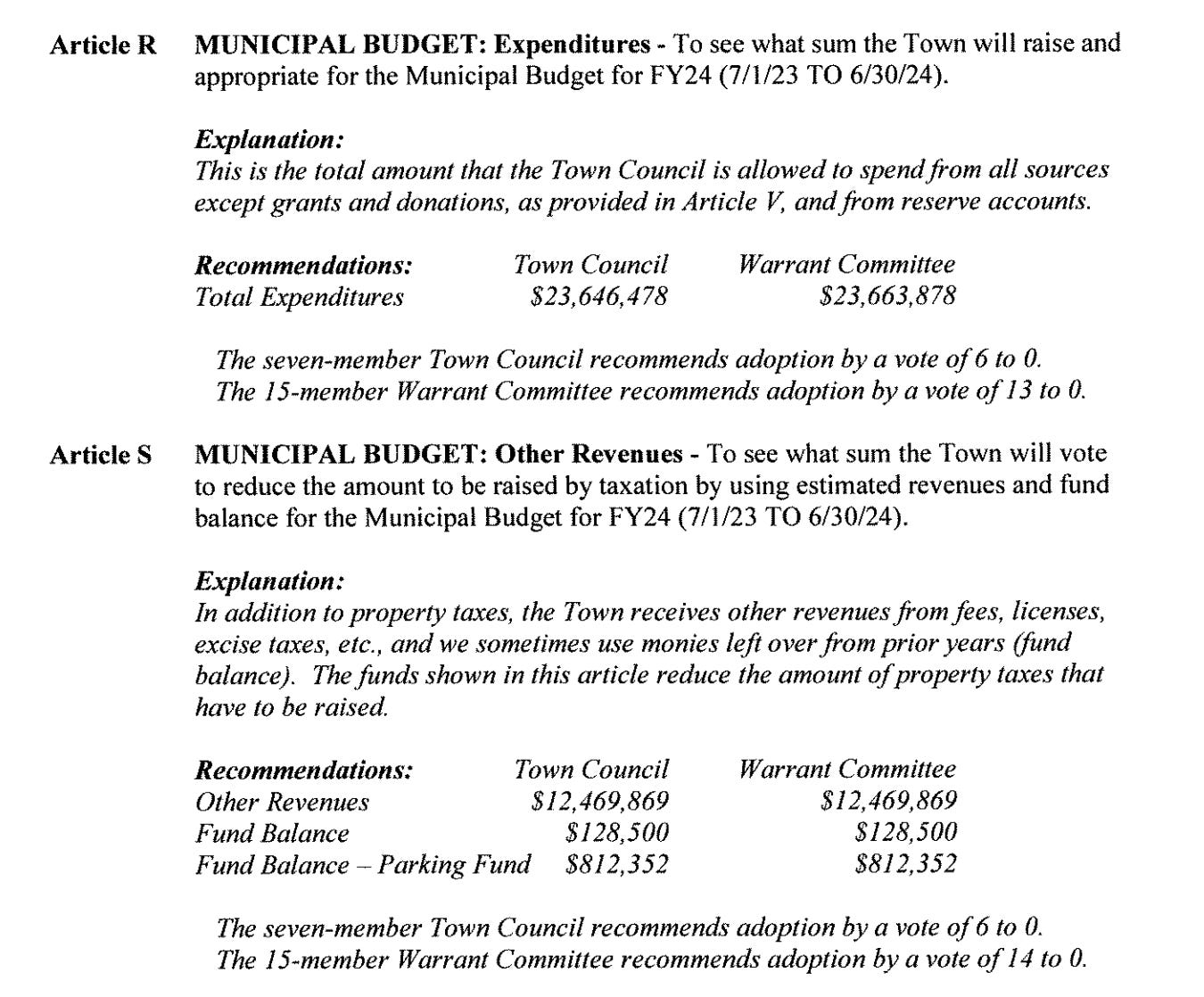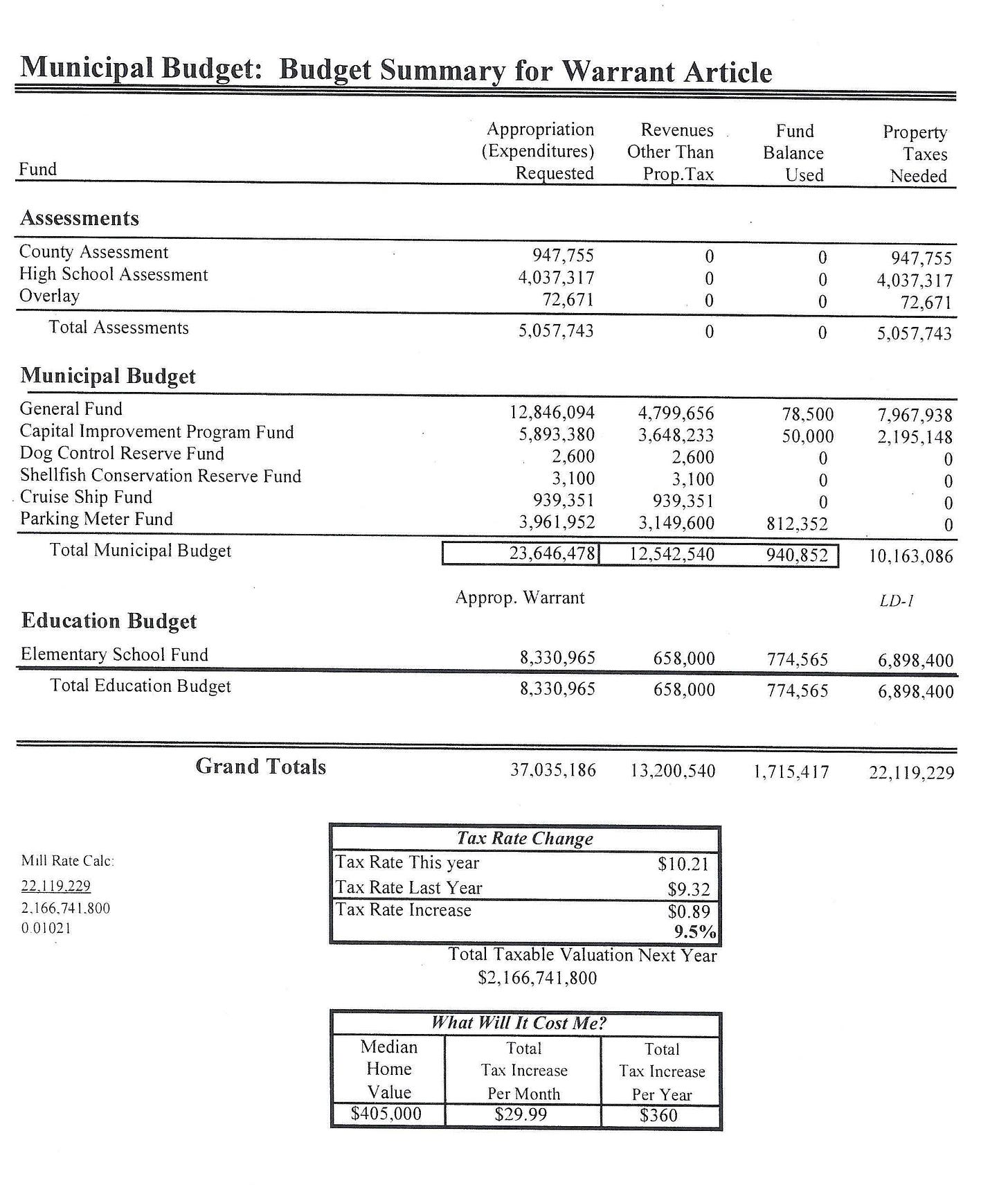Want to Change Something About the Town’s Budget?
You Can’t Do It From in Front of Your Screen, You Need to Attend Town Meeting
BAR HARBOR––Bar Harbor’s annual town meeting is only days away and will be held at the Conners Emerson School gymnasium on June 6, at 6 p.m. Town meeting is an important function as part of our town governance as it is the venue where voters can have the most direct impact on the town’s budget to include the raising, or lowering, of taxes and how that money is spent.
Voters are not always familiar with what is voted on at town meeting, how town meeting functions, or even the importance of attending. This article will attempt to explain some of those issues, with much of the information coming from the “Maine Municipal Association’s A Citizen’s Guide to Town Meeting” which is available here.
This year’s town warrant contains the following articles:
Article A – Election of Moderator
Article B – Education Budget Expenditures: Regular Instruction
Article C – Education Budget Expenditures: Special Education
Article D – Education Budget Expenditures: Career and technical
Article E – Education Budget Expenditures: Other Instruction
Article F – Education Budget Expenditures: Student and Staff Support
Article G – Education Budget Expenditures: System Administration
Article H – Education Budget Expenditures: School Administration
Article I – Education Budget Expenditures: Transportation and Buses
Article J – Education Budget Expenditures: Facilities Maintenance
Article K – Education Budget Expenditures: Debt Service and Other
Article L – Education Budget Expenditures: All Other Expenditures
Article M – Education Budget: Essential Programs and Services
Article N – Education Budget: Additional Local Funds
Article O – Education Budget: Total Expenditures
Article P – Education Budget: State, Federal, and Other Funds
Article Q – Sale of Town Owned Property
Article R – Municipal Budget: Expenditures
Article S – Municipal Budget: Other Revenues
Article T – Municipal Budget: Tax Cap Override
Article U – Municipal Budget: Grants and Donations
Article V – Prepayment of Taxes
Article W – Tax Due Date and Interest Rate
Article X – Overpayment of Taxes
A complete warrant, to include the budgetary numbers, can be found on the Town of Bar Harbor’s website. You can also find the Warrant Committee’s report on the town’s website.
School budget articles, if approved by voters at the meeting total $8,330,965.
For the rest of the budget, the Town Council ($23,646,478) and Warrant Committee ($23,663,878) have slightly different recommendations for expenditures.
Below is the fiscal year 2024 town budget that will be voted on at town meeting. It is broken down by department and includes ancillary items such as revenues and transfers.
Below is budget summary for the town warrant that is a more condensed version of the budget but includes some information about property tax mil rates and what they equal in dollars.
Town Meeting Procedure
It is recommended to arrive at the school, located at the corner of Eagle Lake Road and Eden Street, about 30 minutes early.
Upon arriving at the school’s gymnasium, registered voters will be checked in and given a voter’s card. Those residents who are not registered to vote, as well as non-residents, are welcome to attend.
Registered voters are allowed to speak, but only after being recognized by the moderator. Those who are not voters at town meeting may not speak unless they are recognized by the moderator. The moderator will then ask if a voter would like to make a motion to allow this person to speak. If a motion is made, the moderator will then ask if there is a second. If there is a second, the voters will vote on whether or not to let the person speak.
The first item of business at town meeting is the election of a moderator for the proceedings. The election of the moderator must be by written vote, and last year’s moderator was William Ferm. Once the moderator is sworn in, the reading of and voting on the warrant may commence.
The moderator will read each article and then ask if there is a motion. Once a motion is received, the moderator will ask if there is a second. If a second to the motion is received, then the article will enter into a discussion period. During the discussion period is when the opportunity for any voters to suggest an amendment to the article from the floor occurs. The amendment to the article should be put through as a motion. The moderator will then ask if the motion for amendment has a second. If there is a second, then the amendment has opportunity for discussion. After any discussion, the amendment must be voted on. If the amendment passes, then the original motion, in its amended form is voted on. If the amendment does not pass then the original motion is voted on.
It often goes like this:
Moderator: Reads article. Ask for motion.
Voter: Makes a motion.
Moderator: Asks for a second.
Other voter: Seconds the motion.
Moderator: Tells everyone that there will be discussion. If there is no discussion the motion is voted on.
However, if there is discussion and someone wants to amend the article:
Voter: Makes a motion to amend the article while in the discussion period.
Moderator: Asks for a second.
Other voter: Seconds the motion.
If the motion is seconded, there is an opportunity for discussion. If there is no second, the motion fails.
And again, if the amendment passes, the original motion in amended form is voted on. If the amendment does not pass, the original motion is voted on without the amendment.
Other details
When making motions, it is best practice to not make a negative motion. In other words, make a motion where a yes vote is positive to the motion and a no vote is negative to avoid confusion on the part of the voters.
The vast majority of the warrant is made up of budget items. All motions to amend a budget item must be made with a specific dollar amount, whether the amendment is for more money or less money. A voter cannot make a motion to simply eliminate a particular line item without giving the dollar amount of amendment.
In addition, the Bar Harbor Town Charter states, “Any Town Meeting amendment made to the budget published in the Warrant or Town Report, shall be voted only by written or electronic ballot.” This means that any budgetary amendment vote will be made by written ballot at town meeting.
Also, any voter can move that any article be voted on by written vote before the article is voted on. The motion requires a second and no discussion is allowed before the motion to vote by written ballot is voted on.
If you are unclear on a particular procedural rule or you believe something is being handled improperly, you may say, “point of order” after being recognized by the moderator and ask for an explanation.
Any item or subject not on the town meeting warrant may not be acted on by the voters at town meeting.
The procedure of the town meeting can often be tweaked by the town moderator at their discretion.
Updated: We changed the incorrect date of town meeting and added the last line.










Just a note: the Town Meeting is Tuesday June 6, not June 7.